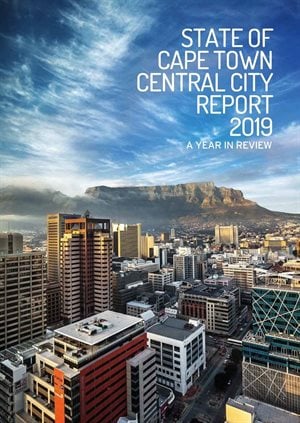2019 State of Cape Town Central City Report launched

Published on Wednesday, 7 October, by the Cape Town Central City Improvement District (CCID), the report noted that the Central City “held its own quite remarkably” in the year under review, despite 2019 being “incredibly difficult”, according to CCID board chairperson Rob Kane.
Says Kane: “Stakeholders and investors in the CBD have had to cope with the aftermath of the 2018 drought and subsequent water crisis, ongoing load shedding and a tough economic climate.”
Five-part section on on 'Surviving Covid-19'
Though the coronavirus pandemic falls beyond the ambit of the SCCR report, a five-part section of the report is devoted to reflections on “Surviving Covid-19” by Wesgro CEO Tim Harris, Economic Development Partnership CEO Andrew Boraine, HTI Consulting CEO Wayne Troughton and economist Brian Kantor of Investec Wealth and Investment and Arthur Kamp, chief economist, Sanlam Investments.
Kane acknowledges the “global devastation” Covid-19 has caused, noting that it “has damaged the Central City’s economy”, but its economic performance means the Central City is well-placed to navigate a path to recovery.
Property evaluation
The SCCR report shows that, according to the City of Cape Town’s 2018/2019 property evaluation, the value of Central City property stands at R44.124bn, and that the total value of property investments in the Central City – recently completed, under construction, proposed or planned – is R13.83bn.
This is broken down into:
- R1,045,000,000 – A conservative estimate of the value of property completed in the Central City during 2019 but which still has to be officially assessed by the City of Cape Town (seven projects);
- R3,730,000,000 - The value of property, conservatively estimated, that is under construction (14 projects);
- R5,196,000,000 – The value of property, conservatively estimated, that is currently in the planning phase (11 projects); and
- R3,860,000,000 – The value of property, conservatively estimated, that is currently proposed and is expected to begin construction within the next two years (six projects).
The Foreshore precinct has emerged as a key property investment node which is due, in part, to the expansion in 2018 of the Cape Town International Convention Centre (CTICC), which achieved a turnover of R277m in 2018/2019. “This world-class venue, which contributed R4.5bn to the Western Cape GGP, was a key driver in 2019 of the Central City’s visitor economy as well as its knowledge and eventing economy, all of which continued to expand in 2019.”
The eighth edition of the SCCR reflects on the bigger picture of the economy of the Central City, looking at property trends, occupancy rates of commercial and residential buildings, retail vacancies, the prominent economies of the Central City and trends in commercial and residential markets.
Among other key findings in the report are that:
For the third consecutive year, Cape Town had the lowest overall vacancy rate of 7. % of the country’s five largest metros. According to the SAPOA Office Vacancy Report (Q4 2019), the city’s vacancy rate compares very favourably to that of Johannesburg (12.5%) and is well below the national office vacancy rate of 11%.
The Central City vacancy rate has continued its gradual decline from a peak of 11.8% at the end of 2018 to 10.8% at the end of 2019 – a decline of 15,127m2 of space available for rent. This is at least partially attributable to the reduction in office space due to redevelopment during 2019.
A new urbanism trend gained traction in South Africa in 2019 in spite of a sluggish housing market, increasing demand for downtown living in the Central City. This has prompted the re-imagining of precincts in the Central City by developers into spaces where homeowners can live, work and play in areas that provide a safe and secure environment with easy access to work. With affordability a major issue for many young professionals, developers are responding with a growing number of studio apartments and co-living units within mixed-use developments. In 2019, small apartments with shared amenities officially became hot property, giving first-time buyers the opportunity to enter the housing market in a desirable city centre.
In 2019, the Central City residential market finally felt the effects of the economic and political headwinds which have dampened activity in the national and regional housing markets in recent years. The distribution of sales across the various price bands was similar to that seen in 2018, with the largest number of sales recorded in the R30,000 – R39,000/m2 category. No sales were recorded in the top price bracket (more than R60,000/m2) last year, while two sales were recorded in 2018.
The report includes separate sections providing a detailed look at key elements of the Central City economy, including:
- The Art Economy: With Cape Town firmly established as the art capital of Africa, the financial contribution of the creative sector to the Central City economy is undeniable;
- The Visitor Economy: With three new hotels opening in the Central City in 2019, several mixed-use developments and aparthotels either being constructed or in the pipeline, the CBD’s multi-layered visitor economy continued to expand in spite of a tight economy;
- The Night-time Economy: There is growing awareness of the potential of the Central City’s night-time economy, but it remains an unexplored resource. A recent research partnership between the City of Cape Town, the CCID and the University of Cape Town will provide a better understanding of the night-time economy of the Central City and how to better use the night as a resource for social and economic development; and
- The Knowledge and Eventing Economy: The Central City’s knowledge and eventing economy continues to expand every year, driving business into the region as local and international visitors and business tourists stream into the CBD to attend official events and conventions in and around the public spaces in downtown Cape Town.
The report also features a detailed analysis of residential and commercial rentals, and highlights from the CCID’s residential and retail surveys.